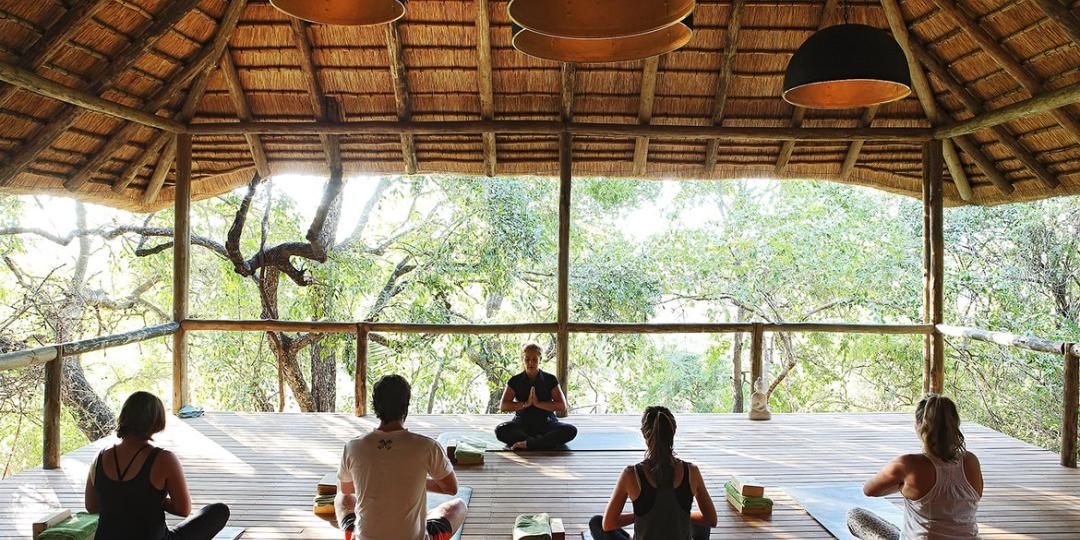With growing emphasis placed on wellness in the face of the pressures of modern living, wellness tourism is emerging as a strong travel trend, and travellers are choosing to include more of these experiences in their itineraries.
The growing wellness movement
Sean Kritzinger, Executive Chairman of Giltedge Africa, says there has definitely been an increase in requests for wellness experiences amongst travellers to southern and East Africa, as clients become more aware of it and how to incorporate it into their travel.
This sentiment was shared by Robyn McEwan, Founder and Owner at RedLip, a PR, digital and communications company serving numerous clients in the hospitality and tourism industry, who says she has noted an increase in travellers looking to immerse themselves in wellness experiences when visiting Africa, especially in the last few months.
Lara Delafield, Wellness Strategist at Giltedge, says: “We are currently seeing a massive growth in wellness tourism both worldwide and in Africa: between 2015 and 2017 there was a 6.5% increase.”
According to Global Health and Wellness Tourism 2018, wellness tourism is growing at 12% each year, as more and more travellers are seeking to reconnect when on holiday.
The Global Wellness Institute estimates that wellness travel will increase by 43% to $808 billion between 2015 and 2020.
Both Lylie Moolman, MD of Giltedge Ocean Islands, and McEwan, believe this is a trend that is likely to continue. “It’s going to be huge for a long time,” says McEwan.
In 2018, Booking.com reported that the trend showed no sign of slowing down, as almost double the number of people planned to take health and wellness trips last year.
Contributing factors
The rapid growth can be attributed to a few factors, says Delafield, however it has been stimulated by a rising global middle class, increased consumer desire to adopt a wellness lifestyle, and interest in experiential travel.
Kritzinger adds that the global interest has been promoted by spa and wellness brands, as well as ‘wellness’ gurus, which has also had an effect on inbound travel to Africa.
With greater awareness of preservation of self and planet, people are becoming increasingly aware of their footprint, as well as their health and lifestyle, explains McEwan, and travellers are now seeking destinations that fit into this new way of thinking.
Millennials are buying into wellness experiences
Airbnb recently revealed 2019’s biggest health and wellness trends, with wellness-related experiences having spiked more than 500% from 2017 to 2018, with notably strong growth among seniors (aged 60 and above), Gen Z (aged between three and 23), and millennials (aged 23 to 38), with more than 800% growth in both age groups.
According to Airbnb, in the past year, it has become clear that wellness travel is resonating with more than just the millennial demographic, as the movement is spanning across all age groups and regions, with seniors (aged 60 and over) being the largest growing consumer base of wellness experiences, with bookings increasing by 887% from 2017.

Based on internal Airbnb data for year-on-year growth by age group of guests booking wellness experiences from 2017 to 2018.
From McEwan’s personal experience, she says millennials are increasingly opting for wellness experiences.
Kritzinger says the millennial market is likely to take more risks when it comes to booking accommodation, tours and experiences. Giltedge Africa has seen an increase in millennials booking experiences, although not just in the wellness niche. Experiences and authenticity are important to both local and international millennials, explains Kritzinger. “As one of the most marketed-to generation, I think it’s easy to generalise this sector and miss the nuances of the individual’s likes and dislikes.”
According to McEwan, key source markets looking to incorporate wellness into their African itinerary include Germany, the UK, US, and The Netherlands, with Brazil coming up close behind.
Wellness tourism is a growing industry; however McEwan believes that South Africa is still a bit behind on this trend, “but but it is definitely growing fast”.
What is a wellness experience?
A wellness experience encapsulates relaxation, the resetting of one’s body and mind with complementary activities that encourage a healthy lifestyle, explains McEwan.
Experiences also include any activity that alleviates stress and anxiety. Mental health has become a significant issue worldwide and people are looking to wellness travel to alleviate their stresses, explains Delafield. It is estimated that in 2017, 11 million wellness trips were booked in the Middle East and Africa, with a $10.7 billion dollar expenditure and five million trips in sub-Saharan Africa with an expenditure of $4.8 billion.
Putting together a wellness package
McEwan suggests that when creating and offering wellness experiences to clients, it is crucial to keep everyone in mind, considering varied fitness levels. “They need to be creative in their offering but also realistic. Follow the trends and work around that,” she suggests.
Moolman believes creativity is key when it comes to wellness experiences, as does McEwan who says: “but also keeping it simple, as it is a recipe that works, you don’t want to try reinvent the wheel”.
There are numerous wellness experiences available to travellers visiting southern and East Africa, from resorts offering sleep doctors to private yoga classes, to organic farm-to-table cuisine. Giltedge Africa creates tailor-made experiences for clients’ wellness needs.
26 Sunset Villa in Cape Town encompasses every element of wellness in the best possible way, says McEwan.
Moolman uses Six Senses resorts as an example, as it is a trend-setting wellness brand that incorporates unique experiences coupled with world-class spas. Moolman says one of its latest trends, ‘Sleep with Six Senses’, allows clients to immerse themselves in a sleep programme, learning sleep techniques. Furthermore, the resort partners with sleep specialist, Dr. Michael Breus and caters for travellers’ needs, from the bedding to the mattresses, pillows, environment, room scents, as well as a fully integrated wellness programme allowing clients to learn the basics of how to get a good night’s rest whilst on holiday. “A must-try,” concludes Moolman.























